Archimandrite Vasily (Philipoff) was a monk of St. Tikhon's Monastery in South Canaan, PA from 1934 until his repose on March 29, 1986. Those who knew him in his decades of prayer and struggle at the monastery remember a saintly man, best remembered as the bread baker for the monastery and the former orphanage. He communed as often as possible and always gave simple and direct advice: pray, work hard, be faithful in Church attendance, obey God’s laws, and never hold anger against another man, and by all accounts, he lived his life thusly.
The 1986 Tikhonaire, the yearbook of St. Tikhon's Seminary, was dedicated to Archimandrite Vasily with the words of Archpriest Sergei Glagolev, and also featured a biography of Fr. Vasily penned by Monk Anthony of St. Tikhon's:
* * *
We need priests to be good pastors. Where shall we find examples to follow? Father Vasily came to St. Tikhon’s fifty-four years ago as Bishop Amphilokhy’s cell attendant. He is remembered for wheeling the ailing bishop around the monastery grounds. Tonsured later as a simple monk, he remained here, never having exalted himself. Such is the mystery of his high calling.
What are his great works? He worked the fields and gardens, baked bread for the monks and orphans, cleaned and served tables. He worked at construction here, and tended beehives. Ordained a priest, he traveled by bus to supply where needed. His most memorable sermon was to the children at Summer Camp, consisting of two short sentences. The book he left us is his tattered English Bible, worn out by constant reverent reading and re-reading. Such are the monuments of his ambitions.
And what of his pastoral practice? It was enough to be in his presence, to receive his blessing, to know you were included in his prayers. He counseled without saying a word. Because his heart was at peace, he could bless you with peace. Such is the pastoral ministry that leads to Christ.
Simple, humble, unassuming, basking in the Spirit-filled glow of a calm and radiant quiet. Fr. Vasily summed up the legacy of his priesthood among us. "Father Vasily," he was asked, "in all these years, have you ever been troubled or lonely?" "No," was his simple answer. "I just worked hard and rejoiced in the Lord." May his memory be eternal; he gives us good cause for rejoicing as well.
—Archpriest Sergei Glagolev
* * *
On Saturday, March 29, at approximately 11:00 a.m., not long after having received the Holy Body and Blood of the Master, the beloved elder of St. Tikhon's Monastery, Archimandrite Vasily, peacefully fell asleep in the Lord. Father Vasily (in the world Vladimir Trofimovich Philippov), was born on July 27, 1893, in the village of Polyakova, in the Province of Volhynia, not far from the famous Pochaev Monastery. His parents were peasant farmers, and Father often talked of his life in the village, especially that part of his life connected with the Church—attending Church School, where he learned to read and write Russian, as well as Church Slavonic, singing in the church choir, and frequently making the pilgrimage to the Pochaev Monastery to venerate the relics of St. Job and to kiss the footprint of the Most-Holy Theotokos preserved there.
In June, 1913, he married a girl from his village, Juliana, and just one month later, in July, he took passage to America, for the purpose of working a while to pay off a small debt incurred on the family farm. Leaving behind his newly-wedded wife, he finally arrived in New York on July 14, 1913, and what was to be only a short sojourn in America stretched out to encompass the rest of his long life, for in the Summer of 1914, World War I broke out and with the onset of the Bolshevik Revolution in 1917, he was unable to return to his homeland. He settled in the Chicago area, where there resided several other young men from his village, working primarily as a common laborer, although at other times he worked as a painter, once even being commissioned to paint the inside and outside of the Holy Trinity Cathedral on S. Leavitt Street, which was his parish home in Chicago. His wife, who was less than one month pregnant when Father left Russia, was delivered of his only child, a daughter Pelagia, and one of the sorrows of his life was that he had never seen her, although he was able, eventually, to correspond with her.
Early in 1932, Bishop Amphilokhy of Alaska arrived in Chicago on his way to St. Tikhon's Monastery to retire, since he was in declining health, and Father, now nearly forty, was persuaded to go with him as his cell-attendant. On March 28, 1932 (fifty-four years almost to the day before his death), Father and Bishop Amphilokhy arrived at the monastery, where the bishop died only eleven months later. Father was encouraged by the monks to remain at the monastery, and accordingly, on March 13, 1934, Father was tonsured into monasticism by Hieromonk Lazar, the acting Superior, and was given the name Vasily.
During his many years at the monastery, Father performed many obediences—working in the fields and gardens, and other farm work—but he was especially remembered for his main obedience for many years—baking bread for the monks and the orphans who lived in the nearby orphan's home. On September 8, 1935, Father was ordained a deacon by Metropolitan Theophilus, and in the spring of 1943, he was ordained a priest. When the late Archbishop Arseny retired to the monastery, Father was chosen to be his cell attendant, just as he had been for the late Bishop Amphilokhy, mainly cooking for him and helping him with various labors around the grounds, including helping the archbishop in the care of the monastery beehives and also helping to build the original St. Tikhon's Seminary library behind the present monastery bell tower.
As was typical for monks of his time, Father, after his ordination to the priesthood, was often sent out to serve parishes in the Wyoming Valley and beyond, as well as New York and New England. As some remembered, whenever he would be sent out as a "supply" priest, he would travel by bus during the night, arrive just in time for the Divine Liturgy, and then return to the monastery before dark on the same day. If at all possible, he always tried to return to the monastery to spend his nights, feeling that it was not proper for a monk to be away from his monastery without need. In January, 1951, he was elevated to the rank of igumen, and, for a short while, during the final illness and death of the Superior, Archimandrite Andronik in 1958-59, he was the acting Superior of the monastery. Finally, in May, 1965, he was elevated to the highest monastic rank, that of archimandrite.
Throughout all these years, Father touched the lives of literally thousands of pilgrims to the monastery by the simplicity of his life and his obvious dedication to the highest monastic ideals of prayer and love for others. He was always willing to give of himself for the good of the monastery and his brothers and sisters in Christ, but always within the confines of the Gospel, preferring never to stray outside of the commandments of Christ. His advice was simple, but direct—pray, work hard, be faithful in church attendance, obey God's laws, and never to hold anger against another man. As a brother in the monastery, I often had occasion to speak with Father about life in the monastery and monastic life in general, and he always encouraged me to stay in the monastery and in monasticism, no matter how discouraged or dissatisfied I might become. He knew that spiritual problems were the same no matter where one might be and he would never counsel a monk to leave the monastery in a vain quest for perfection elsewhere. He knew that a monk's life was a lonely one and that the world would not understand the particular calling of a monk.
Once a little boy walked up to Father—a slender, aged figure in a black cassock, with long, snow-white hair and beard—and asked him very boldly and directly: "Did you ever see God?" Father answered: "Oh yes. I see Him all the time." The little boy then asked: "Well, what does He look like?" And Father replied, expressing a very important dogmatic truth: "He looks just like you."
Father never complained about his lot in life and although throughout the course of his long life he had seen many people come and go, had seen the ranks of monastics dwindle and old friends pass away, he always glorified God. I asked him if during these years he had ever been lonely, and his answer was simple and direct, but very moving: "No, I just worked hard and rejoiced in the Lord."
His final illness was painful for him, but until almost the very end, he tried to attend Church services (although, of necessity, in a wheelchair). The frequent partaking of Holy Communion was important to him and he tried to receive of it at every opportunity, even if only in his cell. In his longsuffering and patience during his final illness, Father served as an example for all who had occasion to witness it as if he were another Job. He asked Bishop Herman to express his thanks to the other monks for taking good care of him and for helping him. His final instructions for them was that they continue to live in the monastery as good monks, for the monastery was a holy place—it had been a holy place when he came there and it would continue to be so for many years to come. On the day of his death, a Memorial Saturday, Bishop Herman brought the Holy Eucharist to Father and spoke with him briefly after the conclusion of the Liturgy. Not more than an hour later, when his cell attendant checked in on him, he found that Father Vasily had departed peacefully to the Lord. How fitting it was that God had granted him the grace to depart to Him so soon after being united to Him both in his sufferings and his mystical union in the Holy Eucharist!
As it was Father's request that he be buried simply as a monk and within a day of his death (as he did not wish a great fuss to be made over him—this in keeping with his humble nature), the brethren of the monastery, led by the Deputy Abbot, Bishop Herman, carefully and lovingly prepared his mortal remains for burial. During the course of the day (of his death) several Panikhidas were served and after the All-Night Vigil that evening, another was served in the monastery chapel attended by all the brethren and many members of the monastery-seminary community. During the night, the bishop and members of the brethren kept vigil at his coffin, accompanied by the reading of the Holy Gospels. At the conclusion of the Sunday Liturgy in the monastery church, Father's remains were transferred there with great solemnity and another Panikhida served by the bishop, clergy and monastery brethren. During the course of the day hundreds of friends and spiritual children of Father arrived at the monastery to pay their respects and at 4:00 p.m., the solemn Burial Service for a Monk was celebrated. During the course of this moving service, various parts were read by the monastery brotherhood and at the end, all joined in singing special Troparia to the Theotokos and the Cross, especially beloved by Father.
As was Father's special request, no special eulogy was given, but rather, as was evident to all present, his very life was his eulogy—a sermon in humility and love of God for all of us.
A very moving moment for all came at the conclusion of the burial service, when Bishop Herman presented the Testament, which he had intended to place in the coffin, to a young boy of the monastery parish community. When this young lad was six years old, he had seen Father sitting on an old wooden bench in the Monastery yard, reading, as was his habit. The boy came to him and asked what he was reading. Father told him it was the New Testament, whereupon the boy asked him if he could have the book. Father told him: "On the day after I die, you go to the bishop and ask him to give my book to you. Then you can have it." On the day of the burial, just as Bishop Herman was leaving to go to the church for the service, the young boy, now nine, knocked on his door. He told Bishop Herman that Fr. Vasily had said that it would be all right to ask the bishop for his New Testament on the day after he died. Bishop Herman had intended to place it in Father's coffin, but upon hearing the story, he gladly gave it to the boy.
After the burial service, a solemn procession was made around the monastery church with Father's remains and the burial was completed nearby in the St. Tikhon's Monastery cemetery, in the midst of those grounds that Father loved so much. As a final request, Father wanted the following message to be related to all who had had occasion to come to him seeking advice over the years: If anyone had been benefited by what he said, he asked that glory be given to God. But if anyone had not received the answer that they needed, he asked only that they pray for his immortal soul.
—Monk Anthony
* * *
Additionally, several who knew Fr. Vasily have offered words in his memory, including Igumen Gregory (Zaiens) who spent many years at St. Tikhon's Monastery:
I came to St. Tikhon's in October of 1976, nine and a half years before Archimandrite Vasily reposed. At that time he was 83 years old. He did not have an active obedience in the monastery outside of serving one daily cycle of the week. He did have a vegetable garden that a nearby farmer tilled which Father cared for. As long as the weather allowed he spent much of the day reading at a picnic table next to his garden. Today there is an outdoor gazebo chapel with a mosaic icon inside with well-kept beautiful flower beds where his garden once stood. However, I believe all who frequented St. Tikhon's during Fr. Vasily's last years would prefer much more to see the simple sight of him sitting next to his garden.
Fr. Vasily attended all the services and rose at midnight when he walked around the monastery grounds while reciting Nocturns from memory. Other than that it is not known what type of personal rule of prayer he kept. He was always the one asked to fill in for others who could not make their turn to serve. Sometimes this would be shortly before the Vespers/Matins service; he always did this willingly without a complaint. What others did not know is that when serving he would only drink and not eat between that early evening service and Liturgy the next morning. He usually had a late afternoon snack those days. He was precise in keeping the fasts of the Church and had nothing the first two days of Great Lent.
As to his spiritual life, Fr. Vasily could be described as a pillar of Orthodox piety—blagochestie. He held that which was God's in honor; he had a holy, blessed, humble, fearless fear of God. He had assimilated this as a natural, organic part of his being. To live with such a person is a great lesson in the Orthodox way of life even if one is never given a word of instruction. There are a few small words which I remember that I could pass on. One time I asked Father: “What is the meaning of humility of wisdom?” He replied, “When you repent, you become humble and then God gives you wisdom.” He once said in a sermon, “Some people say that if you read the Bible too much you will lose your mind. That is true. You will lose your carnal mind and get a spiritual one.”
A short account to end with: Once after the evening service I was going to venerate the central icon in the Church. Fr. Vasily who had served was approaching the icon so I waited. As he neared the icon and I looked at him he physical appearance changed so that he physically looked somewhat smaller than he actually was. He looked extremely humble and it seemed as though he was on fire with prayer.
* * *
Fr. Daniel Ressetar, pastor emeritus of Christ the Savior Orthodox Church in Harrisburg, PA:
When I was attending St Tikhon's Seminary some sixty-five years ago, I became acquainted with Father Vasily who was my father confessor when I was able to speak in Russian more fluently. He was indeed a holy man. I am sure that sometime in the future he will be glorified by the Orthodox Church.
Here are a few stories: On a blustery late November or December day, the sun had just set, I noticed in the dark clouds a strong ray of light shining down in the woods behind the seminary building where the gym is presently located. I kept watching that light which moved on the ground. Out of the woods walks Fr. Vasily with the light from above on him. I was frightened and ran into the seminary building, telling no one what I saw.
Once I asked him "As a monk what is the most difficult thing for you to do?" I was overwhelmed when he answered: "To pray." He was constantly praying.
A group of children were watching him raking his small garden which was located then in front of the four garages. One boy asked him. "Fr Vasily, do you know what God looks like? "Yes, I do. He looks just like you." he answered.
An unwritten (or is it written?) rule is that a serving clergyman (hierarch, priest, deacon, etc.) should always have a service book while serving even if one knows all the litanies and prayers by memory. So many times he chanted the litanies completely by heart (I was the student choir director for Vigils and Liturgies) but in his left hand he always held a closed service book.
* * *
Nicholas Ressetar, son of Fr. Daniel:
Fr. Vasily was serving Liturgy in the monastery church by himself early one morning and he started to levitate in front of the altar table. Metropolitan Herman I believe eye-witnessed this but Martin Paluch said that he will never discuss it with anyone.
Also he would feed by hand deer and other animals that would come up to him near his garden. Sometimes they would poke their heads in the side door of the monastery church if it was open in the summer (because of the heat).
* * *
Olivia, a parishioner of St. Tikhon's:
I often saw Fr. Vasily around the monastery and always wanted to talk to him but it was intimidating—I could tell he was special. Once I saw him sitting on a bench and went and sat with him. We sat silently for a while, but eventually I mustered up the courage to say “our God is great,” and Fr. Vasily simply replied, “yes, He is,” and then we sat in silence again for a while. Eventually Father said some other words that have remained very special for me. Later I told Fr. Gregory that I had spoken with Fr. Vasily, and he surprisedly asked, “do you know Russian?” I said, “no, why?” “Because Fr. Vasily doesn’t know English …”
* * *
There is a popular story of Fr. Vasily that after Pascha he was in the church alone. With the joy of the Resurrection he exclaimed, “Christ is Risen!” and all the icons in the church responded, “Indeed He is Risen!” It also said that the same occurred in the cemetery, with the voices from the graves giving the response. Perhaps this is two versions of the same story, or perhaps it is two separate occurrences.
Photos thanks to Aleksandr Reshetar

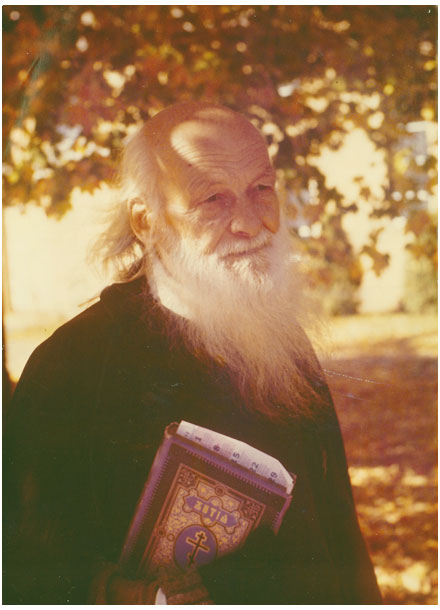
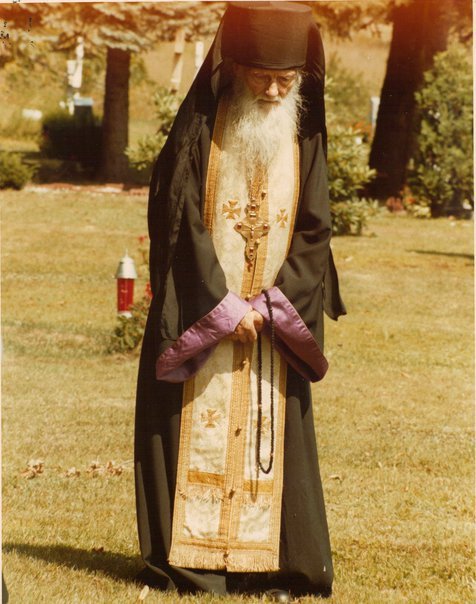
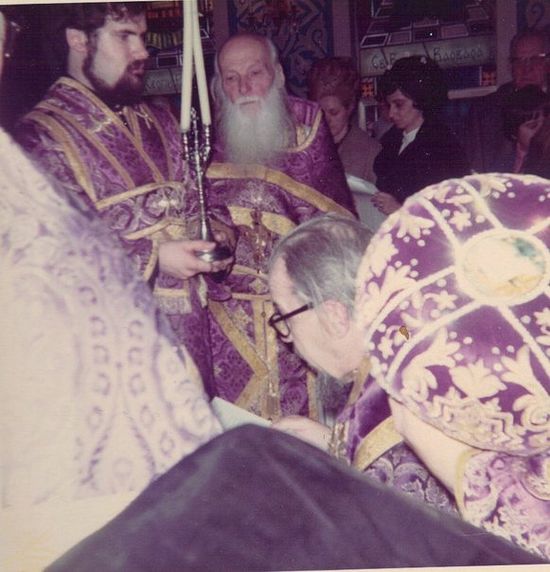
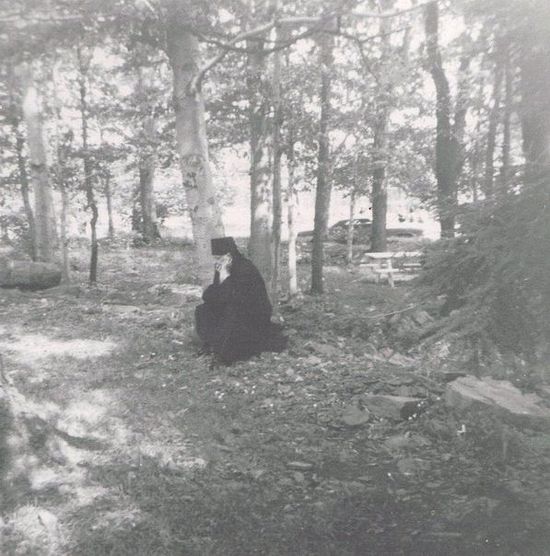
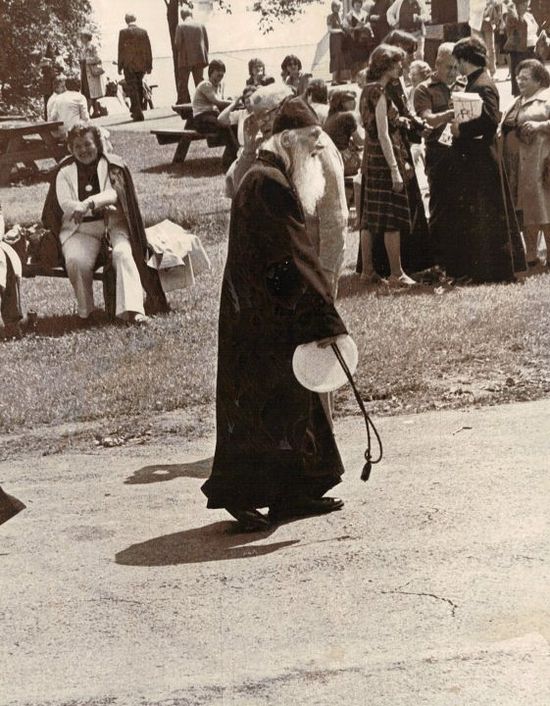
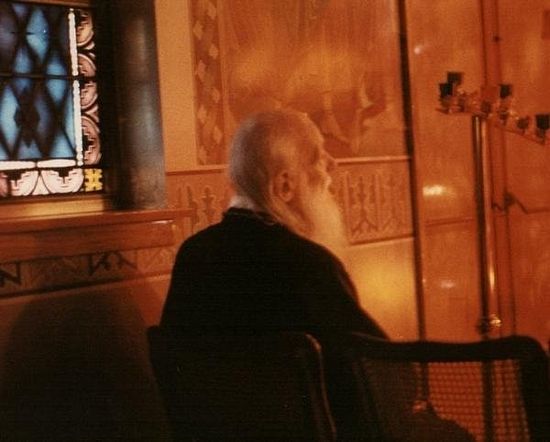

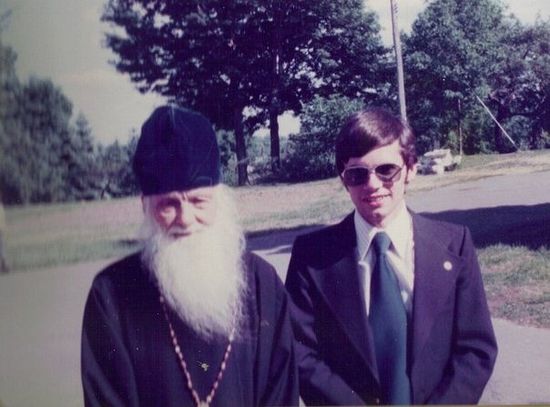
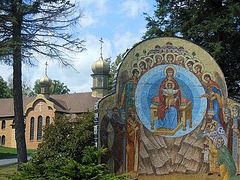
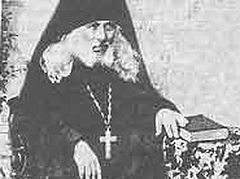
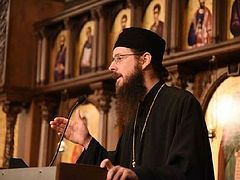
Bishop Nikolai used to call me his granddaughter Maro, since he knew not only me from my birth 3/7 1935, but he knew my grandparents and my mother ever since she was 10 years old back in Belgrade,Yuoslavia.
St. Tikhon's and the Orphanage where my father was a Superintendant for a number of years, was a great school for life! I came to love all these children as my own brothers and sisters by blood! Some of them are still very close to me, and Ronald Belless, is our daughter's Godfather! St. Tikhon's blessed my husband George and me on our wedding, and this blessing is lasting, and keeping us happy for these wonderful almost 60 years! St. Tikhon's is truly my home for all eternity, for George and I will return when our time comes to be buried, and be under the protection of this holy place,our eternal home, St. Tikhon's Monastery!